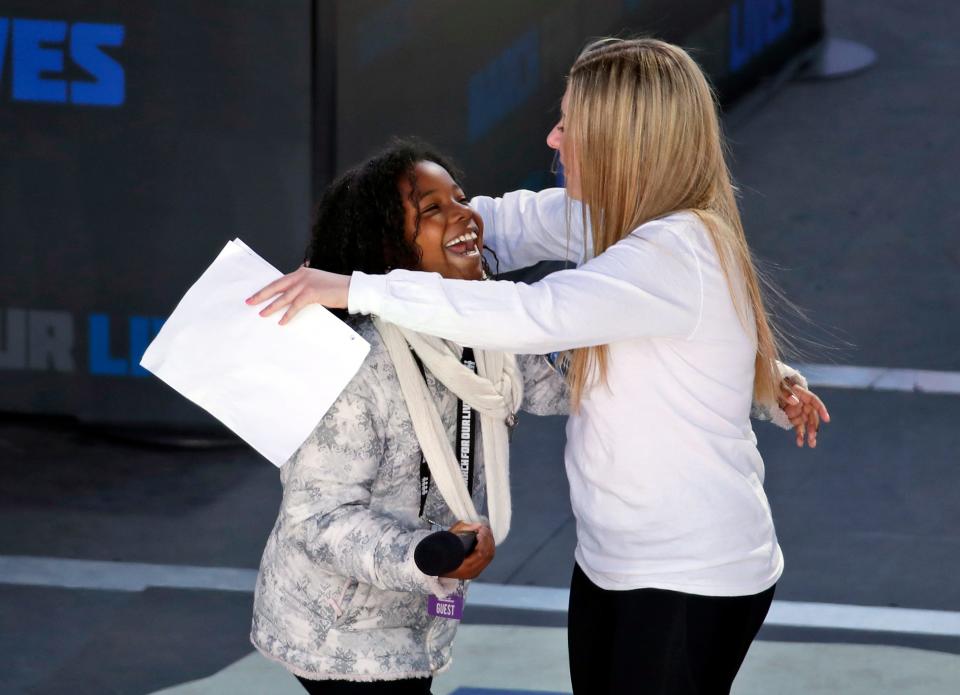'We're angry': Thousands to rally against gun violence Saturday in March for Our Lives protests
- Oops!Something went wrong.Please try again later.
Thousands of gun control advocates were expected to rally across the country Saturday in nationwide March for Our Lives protests to demand action on gun laws after a spate of deadly mass shootings.
Up to 50,000 protesters were expected in Washington, D.C., for a march against gun violence, according to a permit from the National Park Service. Several hundred marches were planned across the country, including in New York City, Las Vegas and Chicago.
It marks the latest widespread move by March for Our Lives, which was founded by teens after 17 people were killed in a shooting at a high school in Parkland, Florida, in 2018. That year, the group rallied more than 1 million people in the nation's capital and hosted sister rallies around the country and world, ramping up public pressure to change gun laws that – four years later – have largely still not been addressed.
Who are the speakers in the district?
On Saturday, protesters were expected to meet at the Washington Monument in the district at noon for the demonstration, which will include speeches, videos and musical performances.
Speakers are set to include co-founders David Hogg, X Gonzalez, Democratic Rep. Cori Bush, National Education Association President Becky Pringle and gun violence survivor RuQuan Brown.
Yolanda Renee King, Martin Luther King Jr.'s granddaughter, will return as a speaker. She spoke at the 2018 demonstration when she was 9 years old, one of the most memorable speeches from the event.
'Let us finally do something': Biden urges Congress to pass bans on assault weapons, high-capacity magazines
MLK's granddaughter says 'enough is enough': Martin Luther King Jr.'s granddaughter has dream 'enough is enough' at March for our Lives protest

The group garnered national attention after its rise in 2018 and continues to push for stricter gun laws, which it says would prevent the scourge of mass shootings across the country. Its march in Washington that year became the largest single-day protest against gun violence in U.S. history.
Daud Mumin, executive co-chairman of the Board of Directors at March for Our Lives, said it is disappointing to see mass shootings continue, but the group won't stop its work in fighting for change.
"Four years later and over 170,000 lives later, we're marching again and we're disappointed," he said. "We're angry, we're raging, we're mad, and we want people across the country to be mad with us. We want people to join us in saying that enough has always been enough."
Will change happen? GOP views on gun laws are shifting. After the Uvalde shooting, could that push Congress to a deal?
From 2018: At 1 million plus strong, March for Our Lives rallies make powerful statement
More mass shootings than days so far this year
The latest March for Our Lives demonstration comes after a mass shootings over the past several weeks, including at Robb Elementary School in Uvalde, Texas, where 19 students and two teachers were killed May 24.
"After countless mass shootings and instances of gun violence in our communities, it's time to take back to the streets and march for our lives," the organization wrote on its webpage.
The organization advocates for solutions it says could help end gun violence such as raising requirements for gun ownership, investing in the safety of communities, holding the gun industry accountable and demanding action from the federal level.
'We're in a paralysis': There have already been a dozen mass shootings this year
Deadliest weekend in the US for mass shootings this year: 3 days, many guns, 17 fatalities
This year has seen 251 mass shootings, according to the Gun Violence Archive, a nonprofit that tracks gun violence. That's more than the 161 days there have been this year.
The Texas school shooting, along with attacks targeting a grocery store in New York, a church in California and a medical facility in Oklahoma, brought gun violence to the forefront of national discourse once again. But changes to gun laws remain uncertain.
On Wednesday, the Democrat-controlled House passed an expansive gun control bill that seeks to raise the age to purchase semi-automatic rifles to 21. The bill faces an uphill path in the evenly split Senate.
'We're going to keep fighting'
But Hogg, a Parkland survivor, wrote on Twitter that "this time will be different" as the organization receives national support and has started to see companies and even some Republicans demand gun violence.
We aren’t going away. This time will be different. pic.twitter.com/REu9im9Imt
— David Hogg ☮️ (@davidhogg111) June 9, 2022
Along with Hogg, Brown will deliver a speech at Saturday's protest in Washington. The 20-year-old has fought for gun violence prevention after his stepfather and a football teammate were killed in two separate shootings while he was in high school in Washington.
"Both of those things really pushed me to begin to advocate for my safety and the safety of my community," Brown said. "I'm coming to this march to speak to all people on behalf of black people who are impacted by gun violence every single day."
Mumin emphasized the work will not end with Saturday's march.
"This work does not stop after June 11. We're going to keep fighting," Mumin said. "We're going to keep marching. We're going to keep mobilizing for a very serious, but simple, message that it is time to take action."
This article originally appeared on USA TODAY: March for Our Lives, June 11: Protests return to US after Uvalde

